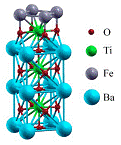Department of Physics and Astronomy: Publications and Other Research

Evgeny Tsymbal Publications
ORCID IDs
Tsymbal http://orcid.org/0000-0002-6728-5480
Document Type
Article
Date of this Version
2020
Citation
Physical Review Letters 124, 067203 (2020)
doi: 10.1103/PhysRevLett.124.067203
Abstract
Antiferromagnetic (AFM) spintronics exploits the N´eel vector as a state variable for novel spintronic devices. Recent studies have shown that the fieldlike and antidamping spin-orbit torques (SOTs) can be used to switch the N´eel vector in antiferromagnets with proper symmetries. However, the precise detection of the N´eel vector remains a challenging problem. In this Letter, we predict that the nonlinear anomalous Hall effect (AHE) can be used to detect the N´eel vector in most compensated antiferromagnets supporting the antidamping SOT. We show that the magnetic crystal group symmetry of these antiferromagnets combined with spin-orbit coupling produce a sizable Berry curvature dipole and hence the nonlinear AHE. As a specific example, we consider the half-Heusler alloy CuMnSb, in which the N´eel vector can be switched by the antidamping SOT. Based on density-functional theory calculations, we show that the nonlinear AHE in CuMnSb results in a measurable Hall voltage under conventional experimental conditions. The strong dependence of the Berry curvature dipole on the N´eel vector orientation provides a new detection scheme of the N´eel vector based on the nonlinear AHE. Our predictions enrich the material platform for studying nontrivial phenomena associated with the Berry curvature and broaden the range of materials useful for AFM spintronics.


Comments
Copyright © 2020, American Physical Society. Used by permission